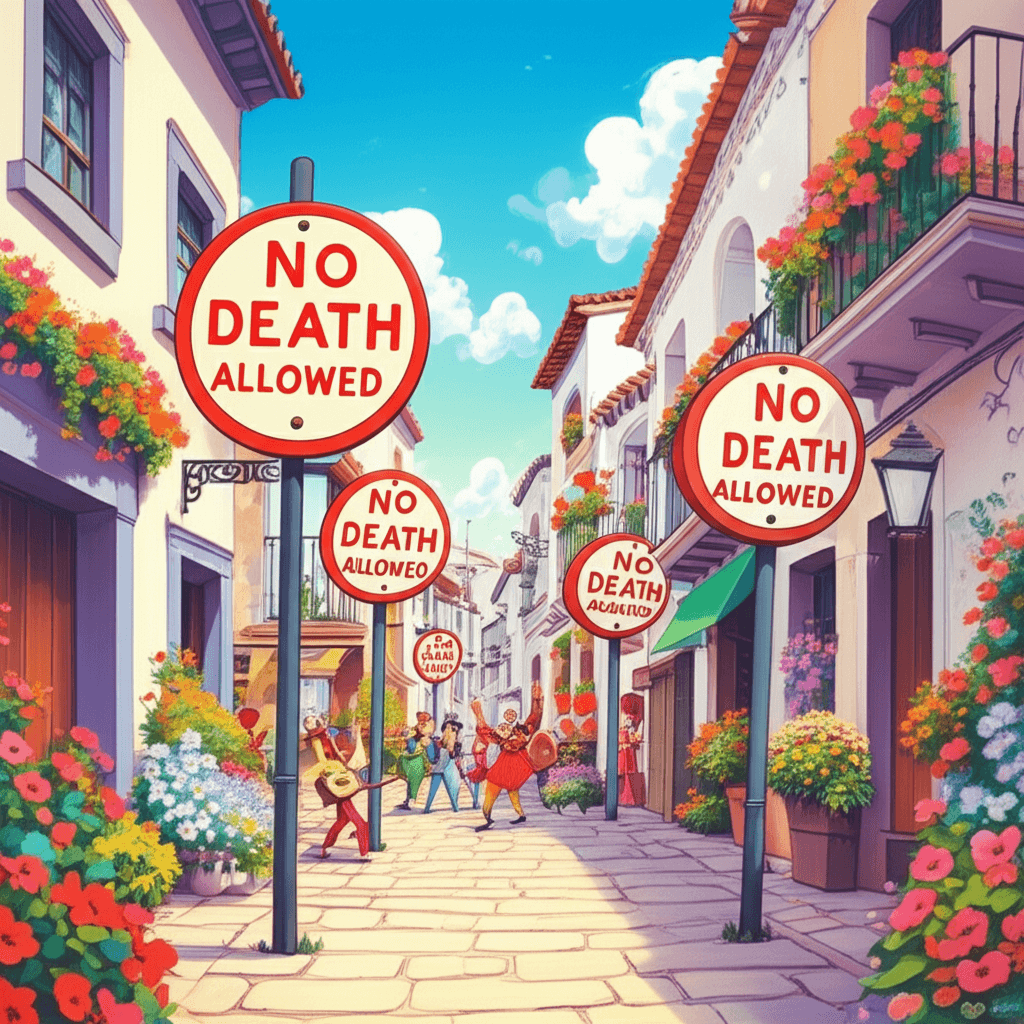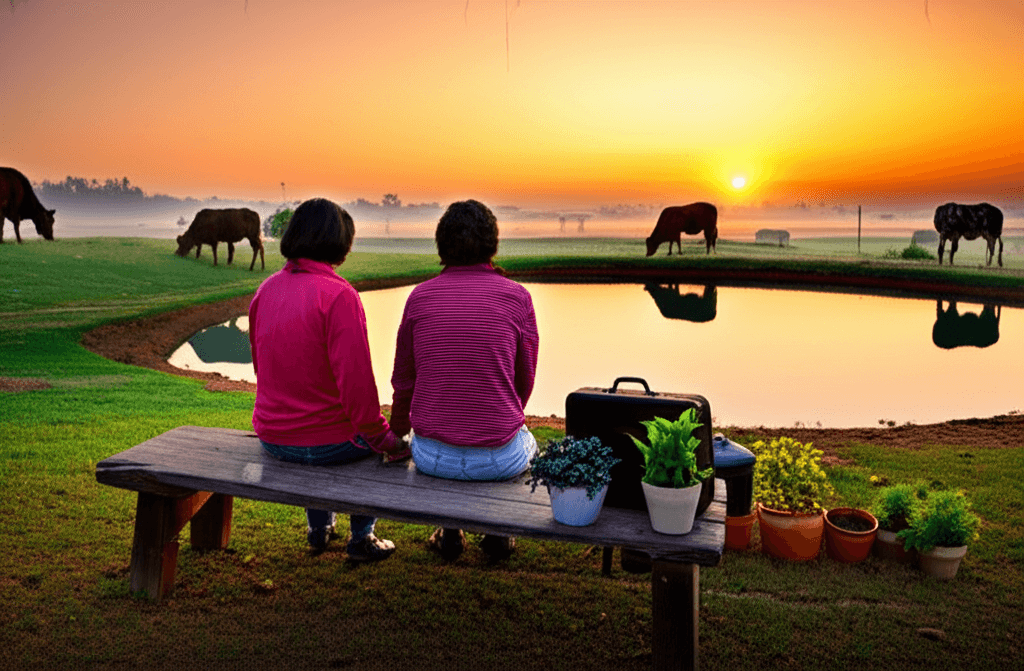The Bizarre Law That Won’t Let You Die in Lanjarón
In the picturesque Spanish village of Lanjarón, famous for its mineral springs and spa culture, there is a law unlike any other: it is illegal to die within the town limits. This unusual decree, enacted in 1999 by then-mayor José Rubio, forbids death in response to a pressing problem — the village cemetery was completely full, and urgent action from higher authorities was nowhere in sight.
At first glance, the idea that people are banned from dying might sound like something from a dark comedy. But the law was neither fully serious nor merely theatrical. It was intended as a satirical protest, a theatrical plea to draw attention to a very real issue: Lanjarón’s inability to provide sufficient burial space for its residents. The mayor proclaimed, “It is hereby forbidden to die in Lanjarón,” not with the expectation of enforcing a death ban, but to shock officials into action and rally local and external support to solve the cemetery crisis[1] [4] [5].
Why the Law Exists: A Grave Problem
The root cause of this morbidly humorous decree was practical and urgent. Lanjarón’s only graveyard had reached its capacity, forcing townsfolk to look elsewhere for burial solutions or rely on authorities to expand the cemetery. However, bureaucracy lagged, and the village faced an impending crisis.
Faced with silence and inaction, the mayor’s “no death” edict was a symbolic measure designed to capture media attention, inject humor into a difficult situation, and mobilize public and governmental response. In hindsight, the stunt was effective in putting Lanjarón’s predicament on the map, with global audiences fascinated by the quirky approach.
Interestingly, this law was never enforced — no fines, arrests, or punishments were ever issued for deaths in the village. Instead, it stands as a piece of local folklore and a reminder of the absurd lengths communities will go to highlight their problems[1] [4].
The Internet’s Fascination and Viral Impact
More than 25 years after its inception, Lanjarón’s death ban has enjoyed a resurgence on the internet’s most vibrant platforms. The decree has been rediscovered by meme accounts, travel bloggers, TikTok creators, and journalists worldwide, sparking amusement, curiosity, and awe.
Reasons this odd rule captivates the digital audience include:
– Irony and Morbid Humor: In a world obsessed with longevity, wellness, and anti-aging, a town “banning death” resonates as a darkly comic paradox. Lanjarón’s association with health springs and rejuvenation enhances this irony.
– Human Interest and Quirk Factor: The idea of a community openly declaring that no one should die there feels both whimsical and poignant, highlighting local creativity in the face of infrastructural neglect.
– Viral Storytelling Power: The law’s quirky narrative is perfect for quick viral bursts on platforms like Twitter, Reddit, and TikTok, where unusual facts and humor spread rapidly.
– Metaphor and Symbolism: For many, the law is a metaphor for bureaucratic gridlock and the challenges small towns face globally, making it relatable beyond the Spanish context[1] [4] [5].
Has the Cemetery Problem Been Solved?
Despite the media attention and decades that have passed, reports suggest that Lanjarón’s cemetery remains the same size without significant expansion. The original problem that triggered the law has lingered, underlining ongoing challenges in local infrastructure and public administration.
Lanjarón has, however, developed a reputation as a wellness destination, attracting visitors with its mineral springs and spa culture. The “don’t die here” law adds a layer of ironic charm to the town’s identity, blending the macabre with the pursuit of health and longevity.
Perspectives and Implications
From Local Officials
The law was a desperate yet playful tool — a reminder that humor can act as both protest and engagement. For Lanjarón’s former mayor Rubio, it was about putting pressure on regional governments to find real solutions to a very real problem.
From Residents
Locals have generally embraced the decree with humor and a light-hearted compliance spirit. It has become local lore rather than a serious mandate.
From Wider Audiences
Internet users see this story as emblematic of how communities can creatively tackle challenges, while also highlighting systemic issues like neglect of rural infrastructure.
What Can Other Towns Learn?
The “no death” law offers practical lessons beyond its odd premise:
– Use of Humor and Satire in Advocacy: Creative protest can cut through bureaucratic silence and attract media attention.
– Raising Awareness of Infrastructure Gaps: Small communities often face overlooked problems that require public awareness to resolve.
– Balancing Tradition and Innovation: Lanjarón’s blend of a quaint village facing modern challenges reflects many rural towns worldwide.
Frequently Asked Questions
Is it really illegal to die in Lanjarón? No, the law is symbolic and not legally enforceable. No penalties are imposed on anyone who dies there.
Why hasn’t the cemetery been expanded? Expansion involves bureaucratic delays, funding challenges, and logistical hurdles typical of small municipalities.
Is Lanjarón safe or healthy given this law? Lanjarón is a popular health and wellness destination famed for its mineral springs, so the ban on dying is more ironic than literal.
Are other towns doing similar things? There are rare instances of symbolic proclamations globally highlighting unique local issues, but Lanjarón’s case stands out due to its morbid humor and longevity.
Final Thoughts
Lanjarón’s “no death allowed” rule is a fascinating slice of human creativity and resilience. It captures the imagination because it blends real-world problems with playful defiance, making it an endearing emblem of local identity that has charmed the internet.
The story invites reflection on how communities navigate challenges with humor and persistence — proving, quite literally, that sometimes you have to think outside the grave to make change happen.
For those intrigued by Lanjarón, planning a trip to this Spanish spa town offers not only wellness but a paradoxical brush with one of the world’s most quirky laws. Just don’t plan to die there anytime soon!
*Explore more stories about unusual laws and small town quirks on our blog.*







